Are you working in a salon and are unsure if the owner has a legal employment structure? Unfortunately, this is a common concern in the salon industry. Learn about salon employment law and misclassification in this blog to save yourself from legal issues and negative tax consequences.
Thank you for reading this post, don't forget to subscribe!
Hi there, my name is Susan Wos and I help salon professionals with their careers and I sell salons. I see this topic come up a lot in salon forums, so let’s get clear on what is legal, and what isn’t!
Classification of licensed professionals in the salon industry is very clear. There are only two categories recognized by the Internal Revenue Service (IRS): employees and independent contractors.
Information for this blog was gleaned from our personal salon experiences, the Department of Labor and the IRS. After reading this blog, check out this quick reference from the IRS on self employed vs employed.
Getting this classification right is important for both salon business owners and salon industry professionals. Misclassification causes significant issues for tax obligations and legal responsibilities.
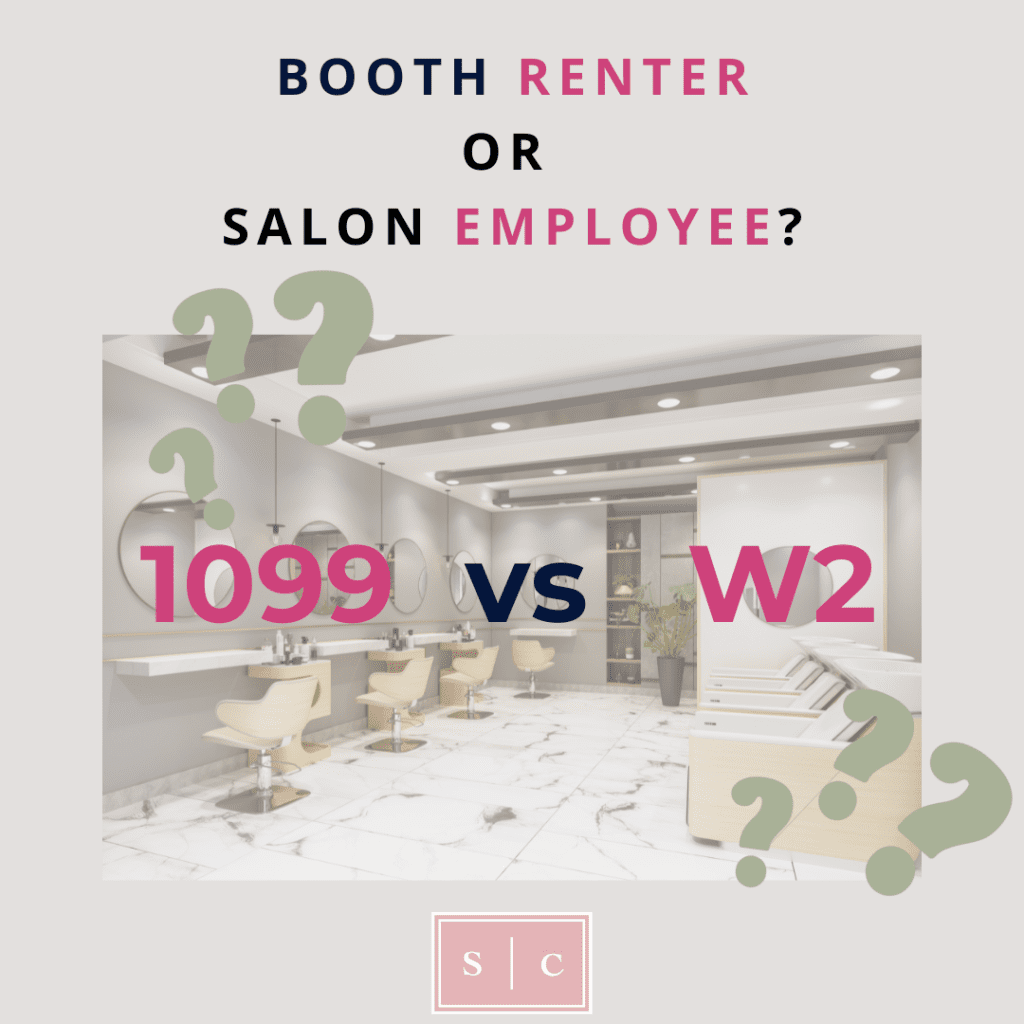
Generally speaking, salon employees get paychecks, clients pay the salon and you are provided with products to perform hair, nail, skin and massage services. Booth renters pay rent to the salon owner, take client payments and provide their own products.
If this still seems unclear, get the right classification with the IRS 20-Factor Test. The 20 factor test is a set of criteria that salon owners and stylists can use to assess employment status. This helps those who are unsure about salon employment law and misclassification to get the clarity you need to stay compliant with the laws of the United States.
Once you understand what salon employment law and misclassification means to your situation, and you are concerned the salon owner is operating illegally, you can contact the US Department of Labor. Complaints can be filed on the contact page for the US Department of Labor.
If you have discovered you are in fact a misclassified salon employee, you can file form 8919 report to the Internal Revenue Service.
Salon culture contracts are agreements that are found in both employee based and booth rental salons. These are agreements between owners and anyone who works in the salon concerning behavior, respect shown to co-workers or even holistic types of products and practices.
These are more of expectations set by owners to maintain a strong, cohesive and healthy environment. These agreements should not involve aspects concerning expectations over time and money, although culture contracts can be written into salon employment agreements.
It’s important to know that there isn’t a specific number of factors that automatically classify someone as an employee or an independent contractor. Instead, it’s about examining the entire working relationship and considering the degree of control and the nature of the work being performed.
Let’s break down each of the 20 factors in the salon industry for a better understanding of how they apply to salon professionals.
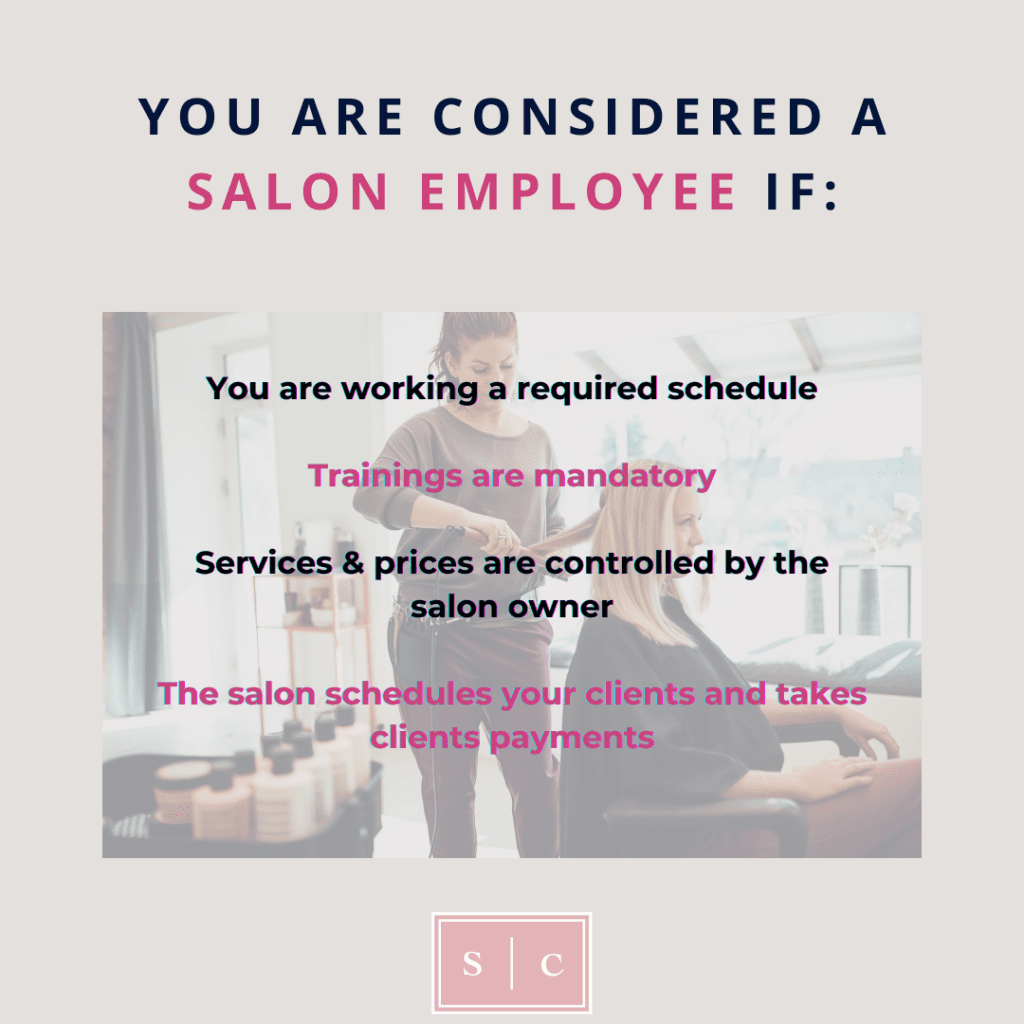
Need To Comply: If the salon owner provides a schedule, station assignments, and specific task instructions, this is an employee relationship. Requiring you to work certain days or hours and dictating which services you can or can’t do is an employee relationship with a salon owner.
Required Training: Requiring stylists to attend specific training, education and certifications can indicate an employer-employee relationship. Mandatory meetings, required use of products or product lines and being required to assist stylists are examples of a salon employee classification.
Service Integration: The nature of salon services makes the performance of these services integral to the salon’s success, implying a level of control by the owner. Do your clients pay you or the salon? If clients pay the salon for services, you are an employee.
*This does not apply to the sale of professional retail products owned by the salon that are for sale.
Services Rendered Personally: If the stylist cannot delegate tasks to others, it’s an indicator of employee status. Think about your clients- do they call you to schedule on your own personal appointment book or salon software? If so, you are considered an independent contractor or booth renter.
Hiring, Firing, Supervising, and Paying Assistants: If stylists can hire, fire, train, and pay their own assistants, you are an independent contractor. If the salon hires, fires and pays assistants, you are an employee.
Continuing Relationship: A long-term working relationship may imply an employee status. Independent contractors often have the freedom to work for wherever they want on any client they choose. If you signed a lease agreeing upon a predetermined salon booth rental price you pay to the owner, you are an independent contractor.
A contract you sign agreeing to set hours of work and requirements of a certain amount of hours to be in the salon, indicates you are employed by the salon. An agreement not to work in another salon within a certain amount of miles and specific time frame is called a salon employee non-compete agreement.
Set Hours of Work: If the salon owner sets or approves the stylist’s schedule, you are in an employer-employee relationship. Dictating schedule, hours required to work or be in the salon, (paid or unpaid), indicates you are an employee of the salon.
Full-time Required: Requiring hair stylists to commit to specific hours and environments that leave no room for other employment indicates you are an employee.
Doing Work on Employer’s Premises: Being required to perform services exclusively at the salon implies control by the owner. Control over not being able to do hair in another salon, by the owner, means you are an employee of the salon.
Order or Sequence Set: Dictating service protocols and procedures can indicate control by the salon owner.
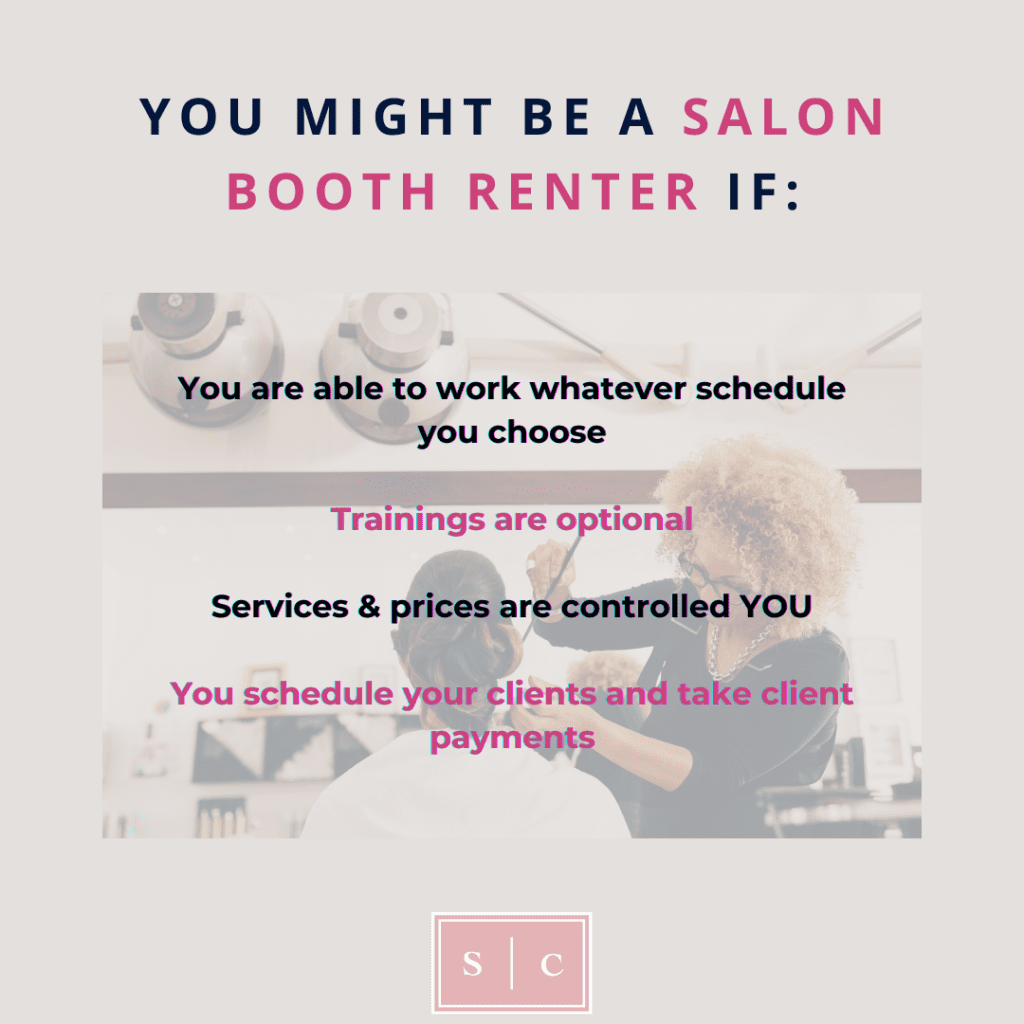
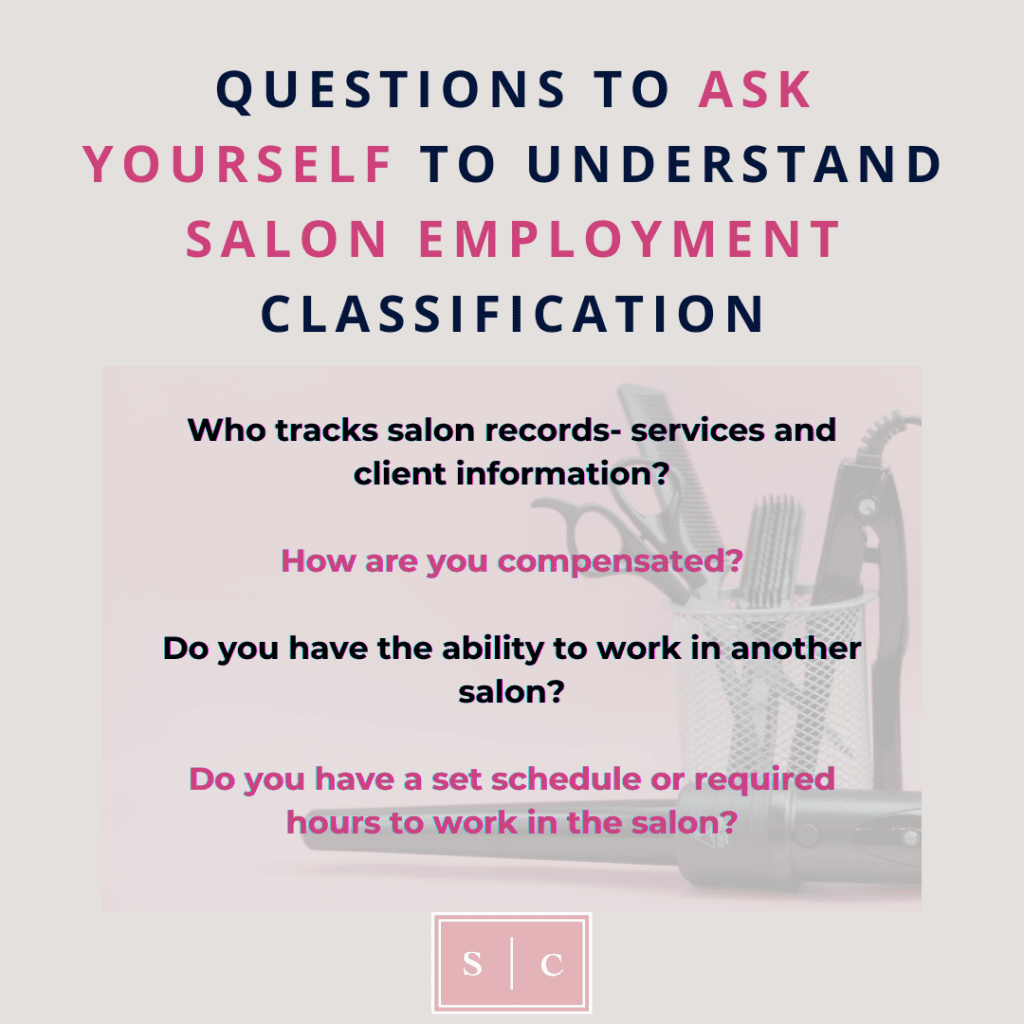
Oral or Written Reports: Keeping records of services provided to clients is a form of reporting, which may indicate employee status. If the salon keeps client records and is tracking payments by clients for you, you are an employee.
If you keep client records on property owned by you, and take payments that go into a bank account owned by you, and you are NOT a salon owner, you are an independent contractor.
Pay by the Hour, Week, or Month: Payment structure suggests either an employee or an independent contractor, depending on the specifics. Working on a commission only basis is generally not legal unless the owner is auditing the hours worked against the commission.
In this scenario, an owner would need to ensure that the workers are making at least minimum wage at the end of each pay period.
Payment of Business & Travel Related Expenses: Who covers business-related expenses, such as product and tool purchases, influences the classification. If a salon owner controls expenses, and can dictate your activities, this signals an employee type classification.
Salon owners provide back bar products, tools and equipment in all types of salons. This varies widely from establishment to establishment and is not an indicator of employment classification. Below are specifics that help determine if you are an employee or an independent contractor.
Furnishing of Tools and Materials: If the salon owner dictates specific brands or products to use, this is typically an employer-employee relationship. Exceptions to this are agreements independent contractors agree to prior to working in a salon that outline requirements, brands and product use.
In other words, if you are a booth renter and you agree to only use certain products in a salon, this is more of a salon culture contract, and is not indicative of employment classification.
Significant Investment: Independent contractors often invest in their own space or facilities within the salon. Paying rent, buying equipment, decorating or renovating the salon are all good indicators that you are a booth renter.
Realization of Profit or Loss: A stylist who invests and takes financial risks may lean more toward independent contractor status. If you have hired an assistant, invested your own money into products or you sell your own retail, these are attributes of a booth renting position.
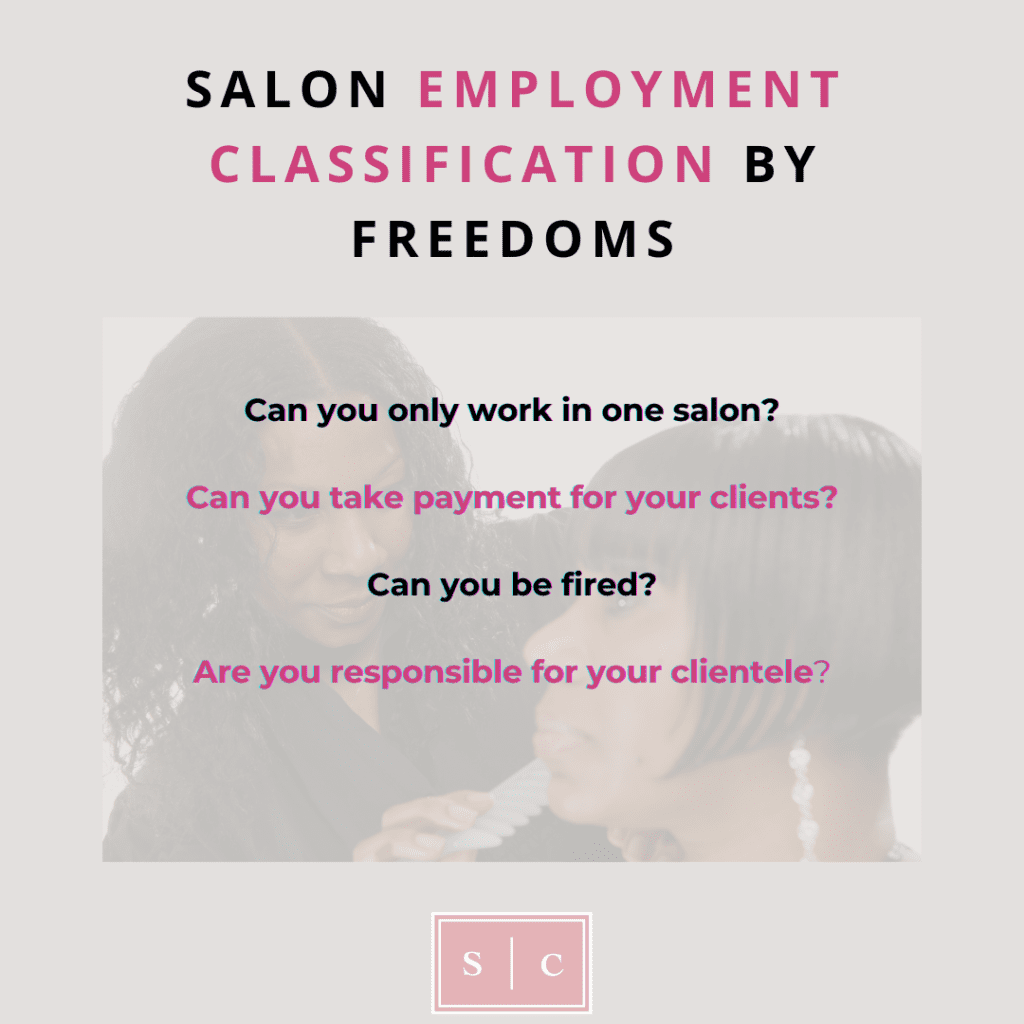
Evaluating restrictions on your freedoms in a salon will help to determine your workplace’s level of compliance with salon employment law and misclassification issues.
Working for More Than One Firm at a Time: The ability to work for multiple salons simultaneously may indicate an independent contractor. If you are restricted from working in another salon, this may indicate that you are an employee.
Making Services Available to the General Public: The freedom to offer services beyond the salon’s clientele can suggest an independent contractor. If you are in a situation where the salon owner restricts your ability to perform services outside of the salon, this is a common trait of an employee-employer situation.
Right to Discharge: The ability to terminate the relationship indicates control, which leans toward employee status. If you can be fired or you can fire another person who works in the salon, this is an employee related relationship. Independent contractors can be discharged if you don’t meet the expectations lined out in a booth rental contract.
Right to Terminate: The freedom to quit without incurring liability may suggest an employee-employer type of status. Independent contractors sign leases, just like you would if you rented a house or apartment.
Protocols for terminating a lease should be lined out in the salon booth rental agreement. If you can quit at any time, meaning you do not have a lease to rent space in a salon to contend with, you are likely a salon employee.
The IRS no longer uses the 20-factor test, but the principles behind it still guide their assessment of worker classification. Some state labor departments also use a similar test to determine employment status.
Understanding the attributes that go into what an employee is or isn’t, helps salon owners and hair stylists navigate the complexities of employment classification and avoid misclassification issues. Always consider the specific circumstances of each case and consult with legal experts if needed to ensure compliance with tax and labor laws.
I hope you have found this salon employment law and misclassification information helpful! Please consult with an attorney should you need additional clarification and help on your specific situation.
Yours in service,